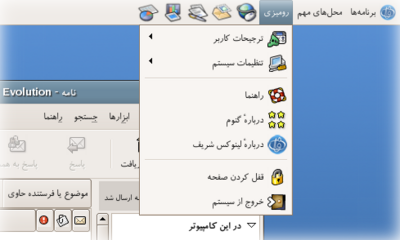Sharif Linux®
Sharif Linux® (لینوکس شریف) is a bilingual English/Persian operating system. It is based on GNU/Linux and is customized for the computing requirements of Iran and the Persian language, specially for enterprise-level and educational uses. [find out more] [screenshots]
Support
Minimum technical support, provided by Sharif FarsiWeb, Inc. by purchasing Sharif Linux Server Edition or Sharif Linux Desktop Updates, includes timely security, bug-fixing, and improvement updates for the several packages included in the operating system. These can be extended with other services based on the customer's requirements, including but not limited to customization for specific requirements, troubleshooting (by phone or in your office), education, and certification.
Latest News
- October 2008: DSpace has been completely localized into Persian for Encyclopaedia of Iranian Architectural History. Sharif FarsiWeb translated its user interface and added many features such as Iranian calendar to it. DSpace is a free and open source software that provides the tools for management of digital assets, and is used as the basis for an institutional or enterprise repository.
- July 2008: Moodle, a free and open source e-learning modular software platform, is now available for Persian users with complete support of Iranian locale requirements including Persian calendar and Persian spellchecker. This version of Moodle is now being used as a course management system by some Iranian educational institutes and complexes.
- January 2008: Sharif FarsiWeb designed the website of Encyclopaedia of Iranian Architectural History using the localized version of open source MediaWiki. MediaWiki is a web-based wiki software originally developed for the free Wikipedia encyclopedia. Nowadays it is being deployed by companies for internal knowledge management.
- April 2007: The GIMP, a free and open source application for graphical design, was completely localized into Persian. Sharif FarsiWeb translated the user interface of The GIMP and provided the translations to the upstream project.
